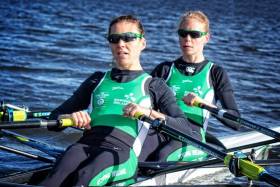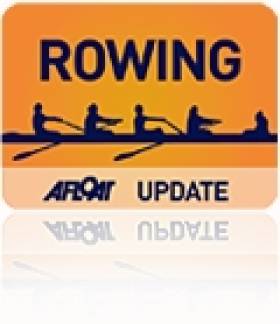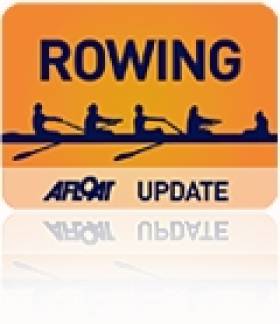Displaying items by tag: Lightweight Four
#Rowing: Ireland ended the first session of the World Cup in Varese with two heat wins and five crews set for the second chance of the repechages. Siobhan McCrohan finished fourth in her heat of the lightweight single sculls and Denise Walsh one place further back in her heat.
The men’s lightweight four finished fourth in their heat. The race was won by Italy Two, with the United States One second. Ireland placed fourth down the course, ahead of fifth-placed Austria One.
World Cup Regatta, Varese (Selected Results, Irish interest)
Men
Lightweight Four – Heat Three (First Two to A/B Semi-Final; rest to Repechages): 1 Italy Two 6:00.40, 2 United States 6:00.95; 4 Ireland (L Seaman, M O’Donovan, L Keane, S O’Driscoll) 6:18.75
Lightweight Double Sculls – Heat Three (First Two to A/B Semi-Final; rest to Repechages): 1 Ireland (P O’Donovan, G O’Donovan) 6:27.07, 2 Britain 6:33.38; 3 Netherlands Two 6:48.24.
Women
Pair – Heat One (First Two to A/B Semi-Final; rest to Repechages): 1 Germany 7:23.08, 2 Russia One 7:24.46; 5 Ireland (L Kennedy, B O’Brien) 7:46.38.
Lightweight Double Sculls – Heat Two (First Two to A/B Semi-Final; rest to Repechages): 1 Switzerland 7:03.98, 2 Canada 7:04.45; 3 Ireland (C Lambe, S Jennings) 7:05.0.
Single Sculls – Heat One (Winner to A/B Semi-Finals; rest to Repechages): 1 Ireland (S Puspure) 7:34.32; 2 Czech Republic (M Knapkova) 7:36.13.
Lightweight Single Sculls – Heat One (First Two to A/B Semi-Final; rest to Repechages): 1 Netherlands Two 7:40.25, 2 Italy 7:45.99; 4 Ireland Two (S McCrohan) 8:02.38.
Heat Two (First Two to A/B Semi-Final; rest to Repechages): 1 Canada 7:42.41, 2 Netherlands One 7:45.30; 5 Ireland One (D Walsh) 8:11.91.
#ROWING: Ireland’s Lisa Dilleen and Helen Hannigan missed out on a place in the semi-finals of the European Rowing Championships when they finished fourth in their repechage of the women’s double sculls. The Ireland crew looked well-placed behind winners Denmark at 1500 metres, but were ousted from the crucial top three by Sweden and France. The men’s lightweight four performed competitively in the early stages of their repechage and showed some form late on, but they finished outside the qualifying spots, in fourth.
European Rowing Championships, Poznan, Day One (Irish interest)
Men
Lightweight Four – Heat One (First Three Directly to A/B Semi-Finals; rest to Repechage): 1 Britain 6:07.57, 2 Germany 6:09.56, 3 Russia 6:09.72; 4 Austria 6:25.53, 5 Ireland (M Bailey, A English, M O’Donovan, S O’Driscoll ) 6:38.91. Repechage (Three to A/B Semi-Finals): 1 Poland 6:23.21, 2 Czech Republic 6:24.04, 3 Austria 6:27.15; 4 Ireland 6:31.10.
Lightweight Double Sculls – Heat Three (Two Directly to A/B Semi-Finals; rest to Repechage): 1 France 6:20.55, 2 Czech Republic 6:27.16; 3 Ireland (P O’Donovan, G O’Donovan) 6:28.06, 4 Greece 6:41.16, 5 Poland 7:04.83. Repechage (Three to A/B Semi-Finals; rest to C Final): 1 Austria 5:54.92, 2 2 Switzerland 5:457.02, 3 Ireland 5:58.15; 4 Poland 5:58.52, 5 Denmark 6:00.12, 6 Ukraine 6:13.88.
Women
Pair – Heat Three (First Three Directly to A/B Semi-Finals; rest to Repechage): 1 Netherlands 7:12.68, 2 Spain 7:16.31, 3 Ireland (L Kennedy, M Dukarska) 7:17.07; 4 Poland One 7:17.84.
Double Sculls (First Three Directly to A/B Semi-Finals; rest to Repechage): 1 Poland 6:49.73, 2 Britain 6:53.58, 3 Serbia 6:55.67; 4 Romania 7:06.54, 5 Ireland (H Hannigan, L Dilleen) 7:24.08. Repechage (Three to A/B Semi-Finals; rest to C Final): 1 Denmark 7:11.44, 2 Sweden 7:12.78, 3 France 7:12.87; 4 Ireland 7:14.04, 5 Finland 7:16.42, 6 Romania 7:12.87.
Ireland
Lightweight Double Sculls (First Three Directly to A/B Semi-Finals; rest to Repechage): 1 Poland 7:06.62, 2 Netherlands 7:09.30, 3 Ireland (C Lambe, D Walsh) 7:15.74; 4 Ukraine One 7:28.07.
Single Scull – Heat One (Winner to A Final; rest to Repechage): 1 Switzerland (J Gmelin) 7:38.33; 2 Lithuania 7:41.28, 3 Germany 7:45.59, 4 Ireland (S Puspure) 7:48.79, 5 Britain 7:53.18, 6 Poland 8:03.51.
Lightweight Single Sculls – Heat Three (First Three Directly to A/B Semi-Finals; rest to Repechage): 1 Germany 7:47.03, 2 Ireland (S Jennings) 7:47.61, 3 Denmark 7:49.41; 4 Poland 8:03.59.
Lightweight Four Emerge from Ireland Trial
#ROWING: A lightweight men’s four of Shane O’Driscoll, Anthony English, Mark O’Donovan and Niall Kenny impressed the selectors at the Ireland trial at the National Rowing Centre sufficiently to become the nominated crew to train in advance of the final trial in March. Sinéad Jennings and Emma Desmond, who are both injured, were missing from the trial for the lightweight women’s double sculls. The matrix for the available candidates ranked Claire Lambe and Denise Walshe as the fastest crew. Paul and Gary O’Donovan are the nominated men’s lightweight double for the March Trials.
Ireland Trial, National Rowing Centre, Cork (Selected Results; ranked on per centage of projected World Championship gold medal winning time)
Men
Four, Under-23 Double and U-23 Lightweight Double: 1 E Rowan, S McKeown (heavyweight double) 7:11.86 (82.4), 2 Coughlan, Deere, Crowley Meehan (four) 6:46.77 (82.4), 3 F McCarthy, M Ryan (lm double) 7:27.35 (80.9).
Sculling and Lightweight Four: 1 G O’Donovan, P O’Donovan (lightweight double) 6:55.94 (87.0), 2 N Kenny, M O’Donovan, A English, S O’Driscoll (light four) 6:42.50 (84.5), 3 J Keohane, P Doyle (heavy double) 7:07.0 (83.2).
Single Sculls: 1 J Ryan (Lightweight) 7:49.42 (84.8 per cent), 2 S Toland 7:59.6 (lwt, 83.0) 3 M Rowan (heavyweight) 7:51.8 (82.7).
Women
Single/Double Sculls, heavyweight – Race One: 1 L Dilleen 8:03.21 (88.0), 2 L Kennedy 8:21.14 (84.8), 3 Dineen/O’Brien 8:06.17 (80.6). Race Two: 1 O Finnegan 8:41.3 (81.5), 2 A Keogh 8:49.40 (80.3), 3 O Forde 9:00.18 (78.7).
Lightweight Double Matrix: 1 D Walsh, C Lambe 7:36.38 (88.1), 2 S McCrohan, Sarah Dolan 7:43.12 (86.8), 3 R Morris, Sarah Dolan 7:56.55 (84.4).































































